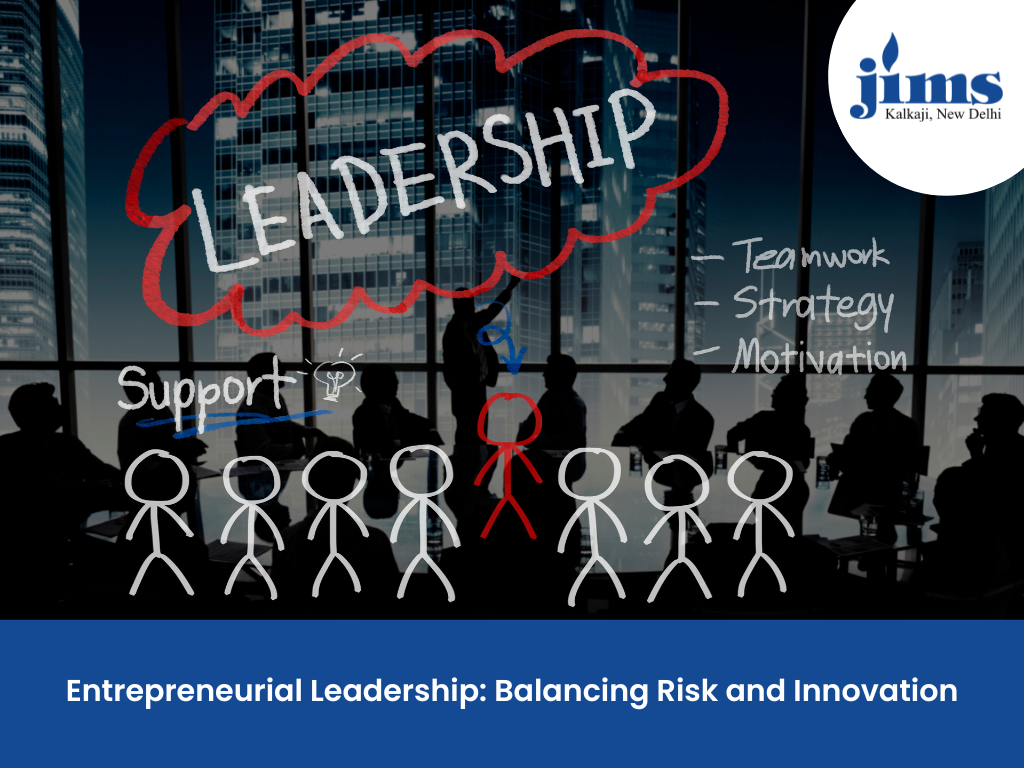In today’s fast-paced and dynamic business landscape, the role of entrepreneurial leadership has gained immense significance. Entrepreneurs and leaders alike are constantly seeking ways to innovate, adapt, and drive their organizations forward. They understand that risk and innovation go hand in hand, and mastering this delicate balance is often the key to success. This article delves into the world of entrepreneurial leadership, discussing how it involves navigating uncertainty, fostering innovation, and the role of top MBA college in Delhi, such as JIMS Kalkaji, in preparing the business leaders of tomorrow.
The Essence of Entrepreneurial Leadership
Entrepreneurial leadership is a management style that combines the vision and risk-taking of entrepreneurship with the strategy and execution of leadership. It is about instilling an entrepreneurial mindset within an organization, encouraging employees to think creatively, act boldly, and drive innovation.
At its core, entrepreneurial leadership involves:
-
Risk-Taking:
Entrepreneurial leaders are not averse to risk; in fact, they embrace it. They understand that without taking calculated risks, there can be no innovation or progress. While conventional management tends to mitigate risk, entrepreneurial leadership encourages a balanced approach that acknowledges and manages risks effectively.
-
Innovation:
Innovation is the lifeblood of entrepreneurial leadership. It involves challenging the status quo, seeking new opportunities, and thinking outside the box. Innovations can be in the form of new products, services, processes, or business models.
-
Vision and Strategy:
Entrepreneurial leaders have a clear vision for the future of their organizations. They also possess the strategic acumen to translate that vision into actionable plans. This involves setting goals, creating roadmaps, and aligning the entire team with the overarching mission.
-
Adaptability:
In today’s rapidly changing business environment, adaptability is crucial. Entrepreneurial leaders are flexible and responsive to market shifts, technological advancements, and evolving customer preferences.
-
Resilience:
Because entrepreneurship involves risk, setbacks are inevitable. Entrepreneurial leaders must exhibit resilience and the ability to learn from failures and bounce back stronger.
The Duality of Risk and Innovation
Balancing risk and innovation is at the heart of entrepreneurial leadership. To succeed in this endeavor, leaders must understand the duality of these two concepts.
-
Risk as a Catalyst for Innovation
Risk, when managed wisely, serves as a catalyst for innovation. It challenges the status quo and encourages experimentation. Without the willingness to take risks, groundbreaking innovations would remain elusive.
In the world of business, this often translates into strategic risks, such as entering new markets, launching disruptive products, or making significant investments. The risk-taking nature of entrepreneurial leadership can lead to breakthroughs that propel the organization ahead of its competitors.
-
Innovation as a Mitigator of Risk:
Innovation can also be a powerful tool for mitigating risk. By constantly innovating, organizations can diversify their offerings, reduce reliance on a single revenue stream, and adapt more effectively to changing market conditions. For instance, a business that relies solely on one product may face significant risk if that product becomes obsolete. However, by fostering a culture of innovation and exploring new product lines, the organization can reduce its vulnerability to such risks
The intertwining of risk and innovation in entrepreneurial leadership is a delicate dance. It involves evaluating potential risks, assessing their potential impact, and then devising innovative strategies to navigate these challenges.
The Role of Education in Developing Entrepreneurial Leaders
To master the art of entrepreneurial leadership, many aspiring business leaders turn to higher education, particularly MBA programs. Delhi, being a hub for education and business, offers several top MBA colleges where students can hone their entrepreneurial leadership skills. One such institution is Jagannath International Management School, Kalkaji.
JIMS Kalkaji: Nurturing Tomorrow’s Entrepreneurial Leaders
Jagannath International Management School, Kalkaji (JIMS Kalkaji), is one of the leading institutions in Delhi offering MBA programs that foster entrepreneurial leadership. The institute’s commitment to quality education and a conducive learning environment has made it a preferred choice for aspiring business leaders.
-
Industry Integration:
JIMS Kalkaji maintains strong connections with the corporate world. It regularly invites industry experts for guest lectures and workshops, ensuring that students are exposed to the latest industry trends and best practices in entrepreneurial leadership.
-
Entrepreneurship Cell:
The institute has a dedicated Entrepreneurship Cell that encourages students to explore their entrepreneurial potential. It offers mentorship, guidance, and resources for students looking to launch their startups.
Balancing Risk and Innovation: A Focus at JIMS Kalkaji
JIMS Kalkaji understands that entrepreneurial leadership hinges on the ability to balance risk and innovation. The institute’s curriculum, faculty, and extracurricular activities are designed to instill this critical skill in its students.
The focus on risk and innovation at JIMS Kalkaji can be observed in various aspects:
-
Innovative Pedagogy:
The institute employs innovative teaching methods to foster creative thinking. Case studies, group projects, and simulations are used to challenge students and encourage them to develop innovative solutions to real-world problems.
-
Incubation Center:
JIMS Kalkaji hosts an incubation center where students can work on their entrepreneurial ventures. This real-world experience allows them to understand the risks and rewards associated with starting and managing a business.
-
Mentorship Programs:
JIMS Kalkaji provides mentorship programs where students can connect with experienced entrepreneurs and business leaders. These mentors offer guidance on balancing risk and innovation in the business world.
-
Guest Lectures and Workshops:
Regular guest lectures and workshops by successful entrepreneurs are organized to expose students to real-life stories of innovation and the associated risks. These events offer insights that textbooks alone cannot provide.
Conclusion
Entrepreneurial leadership is about embracing calculated risks while fostering a culture of innovation. The delicate balance between risk and innovation is the hallmark of successful entrepreneurial leaders. Pursuing an MBA program in Delhi, particularly at a top institution like JIMS Kalkaji, can equip aspiring business leaders with the knowledge, skills, and exposure they need to excel in entrepreneurial leadership. As the business landscape continues to evolve, the importance of entrepreneurial leadership and the ability to balance risk and innovation remains as crucial as ever.

